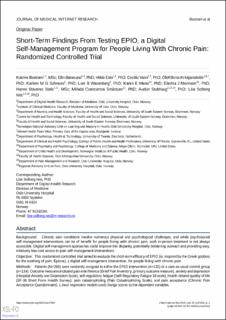| dc.description.abstract | Background: Chronic pain conditions involve numerous physical and psychological challenges, and while psychosocial self-management interventions can be of benefit for people living with chronic pain, such in-person treatment is not always accessible. Digital self-management approaches could improve this disparity, potentially bolstering outreach and providing easy, relatively low-cost access to pain self-management interventions. Objective: This randomized controlled trial aimed to evaluate the short-term efficacy of EPIO (ie, inspired by the Greek goddess for the soothing of pain, Epione), a digital self-management intervention, for people living with chronic pain. Methods: Patients (N=266) were randomly assigned to either the EPIO intervention (n=132) or a care-as-usual control group (n=134). Outcome measures included pain interference (Brief Pain Inventory; primary outcome measure), anxiety and depression (Hospital Anxiety and Depression Scale), self-regulatory fatigue (Self-Regulatory Fatigue 18 scale), health-related quality of life (SF-36 Short Form Health Survey), pain catastrophizing (Pain Catastrophizing Scale), and pain acceptance (Chronic Pain Acceptance Questionnaire). Linear regression models used change scores as the dependent variables. Results: The participants were primarily female (210/259, 81.1%), with a median age of 49 (range 22-78) years and a variety of pain conditions. Analyses (n=229) after 3 months revealed no statistically significant changes for the primary outcome of pain interference (P=.84), but significant reductions in the secondary outcomes of depression (mean difference −0.90; P=.03) and self-regulatory fatigue (mean difference −2.76; P=.008) in favor of the intervention group. No other statistically significant changes were observed at 3 months (all P>.05). Participants described EPIO as useful (ie, totally agree or agree; 95/109, 87.2%) and easy to use (101/109, 92.7%), with easily understandable exercises (106/109, 97.2%). Conclusions: Evidence-informed, user-centered digital pain self-management interventions such as EPIO may have the potential to effectively support self-management and improve psychological functioning in the form of reduced symptoms of depression and improved capacity to regulate thoughts, feelings, and behavior for people living with chronic pain. | en_US |

